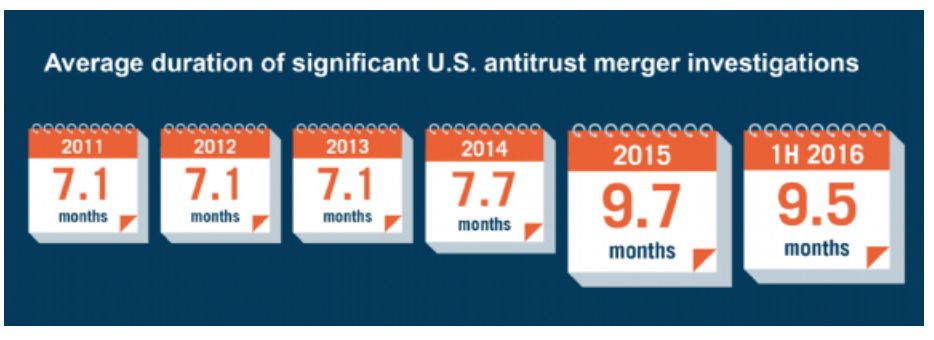Antitrust Updates for Private Equity Firms
In an era of robust merger enforcement by the U.S. antitrust agencies, opportunities abound for private equity firms to acquire divested businesses for value. These acquisitions of divested businesses are increasingly subject to review by the agencies prior to the closing of the main transaction, and private equity buyers should be well-prepared to demonstrate to the parties, and then again to the agencies, how they will ensure that the divested business will replace any competition lost between the parties. Private equity buyers should also account for the increased length of government merger investigations in their deal analysis. Finally, private equity firms should seek guidance before asserting the investment-only exemption to the HSR Act since the agencies have recently stepped up enforcement actions against firms that are improperly claiming the exemption. Investors should also have a compliance program in place since the maximum civil penalties for HSR violations recently increased to a maximum of US$40,000 per day for each violation.
Divestiture Opportunities for Private Equity Purchasers
As the Federal Trade Commission (FTC) and the Department of Justice (DOJ) continue to aggressively pursue merger control investigations, the agencies’ strong preference for resolving anticompetitive concerns through divestitures opens up numerous opportunities for private equity buyers to acquire high performing assets for value. The agencies' increasing insistence on identifying “upfront buyers” rewards those buyers who are well-prepared and can execute a carefully planned regulatory strategy.
Over the last quarter century, the agencies have strongly favored remedying perceived anticompetitive effects of mergers and acquisitions with structural remedies (i.e., divestitures) and, since 2014, the agencies have required upfront buyers in approximately 85% of all investigations resolved with an agreed-upon divestiture. The upfront buyer requirement provides significant leverage for the proposed buyer: the parties to the main transaction may not close until the reviewing agency has investigated and approved the buyer of the divestiture package. Parties therefore favor upfront buyers who can pass regulatory muster quickly.
While financial buyers are often attractive because they generally do not contribute to market consolidation, the agencies will carefully examine whether a financial buyer can utilize the divested assets to replace the perceived loss of competition in the marketplace, which is their primary concern in this setting. A financial buyer must therefore be prepared to demonstrate to the agency that it possesses the requisite expertise to ensure that the divested business will emerge as a strong competitor in the market. In this regard, proposed buyers should be prepared to demonstrate how prior investments made in the same or similar industry have succeeded, as well as commit to retaining key senior employees of the divested business. In addition, a financial buyer must commit to sufficiently capitalizing the divested business over the long term. More than simply demonstrating that the firm has sufficient resources to fund the acquisition and immediate capital needs of the divested business, firms should develop a robust model showing how anticipated capital needs (e.g., to fund expansion plans or R&D efforts) will be met over time. Conservative capital structures favoring more equity financing may be preferable to higher debt financing, as this can avoid agency investigations of proposed lenders as well as demonstrate the buyer’s faith in the strength of the divested business. Finally, financial buyers should be prepared to demonstrate that they intend to remain “in the game” for the long-term, as the agencies will be skeptical of divestiture buyers looking for a quick exit.
Following the well-publicized bankruptcies of divested businesses that had been purchased by financial buyers, the agencies are likely to increase their scrutiny of such deals in the future. For this reason, financial buyers must be prepared on Day One to demonstrate to the agency that it has the ability to position the divested assets to compete effectively in the marketplace over the long-term.
Lengthier Merger Investigations Must Be Accounted For In Transaction Agreements
According to the Dechert Antitrust Merger Investigation Timing Tracker (DAMITT), the average length of a significant merger investigation by the FTC and DOJ was 9.5 months for the first half of 2016. Significant merger investigations include HSR-reportable transactions resulting in a closing statement, consent order, complaint challenging a transaction, or transaction abandonment for which the antitrust agencies take credit.
Although the duration of significant investigations has stabilized, the 9.5 month average recorded during the first half of 2016 is more than 30 percent longer than the 7.1 month average recorded by DAMITT in each of the 2011, 2012, and 2013 calendar years. Significant merger investigations are taking longer to complete, which may in part be due to the increased use of “upfront buyers” for divested assets. Investigations ending with divestiture consents requiring an upfront buyer lasted about 2.4 months longer than consents with only post-order buyers.

Just as the length of significant merger investigations has been increasing in recent years, merger litigation is also taking longer. The average duration of merger litigation has increased from 124 days in 2011 to 146 days in 2015, an increase of about 20 percent.
In negotiating the termination date of transaction agreements, parties need to plan not only for the increased duration of significant merger investigations, but also for the increased duration of merger trials if they are considering litigation options.
For more information please see the DAMITT Q2 Update.
Firms Improperly Relying on the HSR Investment-Only Exemption Face Increased Enforcement Actions and Higher Maximum Civil Penalties
The FTC and the DOJ have recently stepped up enforcement actions against firms that improperly rely on the investment-only exemption to the Hart-Scott-Rodino Act (HSR Act). The HSR Act requires parties to submit a notification filing and observe the applicable waiting period prior to closing on certain transactions.
The investment-only exemption for HSR filings is available for acquisitions of less than ten percent of the outstanding voting securities of the issuer, but only if the acquisition was made “solely for the purpose of investment.” Institutional investors, such as an investment company registered with the Securities and Exchange Commission (SEC) under the Investment Company Act of 1940, broker-dealers, and finance companies, can acquire up to fifteen percent without making an HSR filing if they qualify for the investment-only exemption.
The definition of “solely for the purpose of investment” requires that the acquiring person at the time of the acquisition “has no intention of participating in the formulation, determination, or direction of the basic business decisions of the issuer.” Activities that could be viewed as inconsistent with an investment only purpose include nominating a candidate for the board of directors of the issuer, proposing corporate action requiring shareholder approval, soliciting proxies, actively supporting or opposing a proposed acquisition, and similar conduct. The only activity that the FTC has expressly found to be consistent with the required passive intent is “merely voting the shares” held by the investor.
It is important to note that the FTC and the SEC do not apply the same definition of the term “passive.” For purposes of the HSR Act, the FTC finds it irrelevant whether a company files Schedule 13G as a passive investor or Schedule 13D as a non-passive beneficial owner. Likewise, in July 2016 the SEC stated that a shareholder’s inability to rely on the HSR investment-only exemption does not prevent it from filing on Schedule 13G.
In addition to stepping up HSR enforcement actions, in August 2016 the FTC raised the maximum civil penalty for failing to make an HSR filing from US$16,000 to US$40,000 each day a person is in violation. As a result, investors and other acquirers should have a compliance program in place to ensure that they make all necessary HSR filings.


